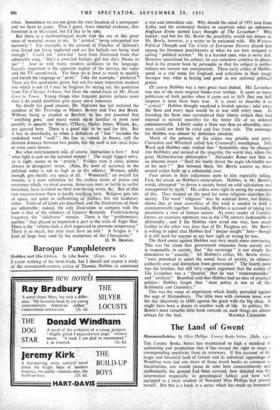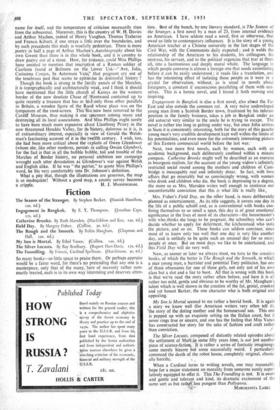The Land of Gwent
Monmouthshire. By Olive Phillips. County Books Series. (Hale. is.) THE County Books Series has maintained so high a standard of authorship and production. that itrhaS earned the right to exact a corresponding sensitivity from its reviewers. If this account of the tragic and beautiful land of Gwent and its industrial appendage of Wentllwg were jusi one more of those travel books as common as blackberries, one would pause to note how conscientiously and methodically the ground had been covered, how detailed ,was the information (especially in genealogical tables) and how well equipped as a local resident of Newport Miss Phillips had proved herself. But this is a boiok in a series which has made an honoured name for itself, and the temperature of criticism necessarily rises from the subnormal. Moreover, this is the country of W. H. Davies and Arthur Machen, indeed of Henry Vaughan, Thomas Traherne and Francis Kilvert, if one strays a little over the boundaries, and by such precedents this study is woefully pedestrian. There is more poetry in half a page of Arthur Machen's,Autobiography about his own Gwent than there is in this whole book, and it is country to draw poetry out of a stone. How, for instance, could Miss Phillips have omitted to mention that inscription of a Roman soldier, of Caerleon found at Bulmore on the Lower Usk—" Ave, Julia, Carissima Conjux, In Aeternum Vale," that poignant cry out of the tenebrous past that seems to epitomise its distressful history ?
Though the book is strong in the family annals of the Marches, it is topographically and architecturally weak, and I think it should have mentioned that the little church of Kemys on the western border of the now desolate Chase of Wentwood contained up to quite recently a treasure that has or had-cmly three other parallels in Britain, a wooden figure of the Rood whose place was on the tympanum of the rood-screen. This'has now been removed to the Cardiff Museum, thus making it one specimen among many and destroying all its local associations. 'And Miss Phillips ought surely to have been much more expansive about Llanthony Priory, in the now threatened Honddu Valley, for its 'history, dolorous as it is, is of extraordinary interest; especially in view of Gerald the Welsh- man's fascinating account of it in the twelfth century. I wish, too, she had been more critical about the exploits of Owen Glendower (whom she, like other moderns, persists in calling Owain Glyndwr), for the fact is that in all the bubble bubble, toil and trouble of the Marches of Border history, no personal athbition nor campaign wrought such utter devastation as Glendower's war against Welsh and English alike. If he was "the patriot," to quote Miss Phillips's word, he fits very comfortably into Dr. Johnson's definition.
What a pity that, though the illustrations are generous, the map is so inadequate! Without a good map, a county survey becomes



































 Previous page
Previous page